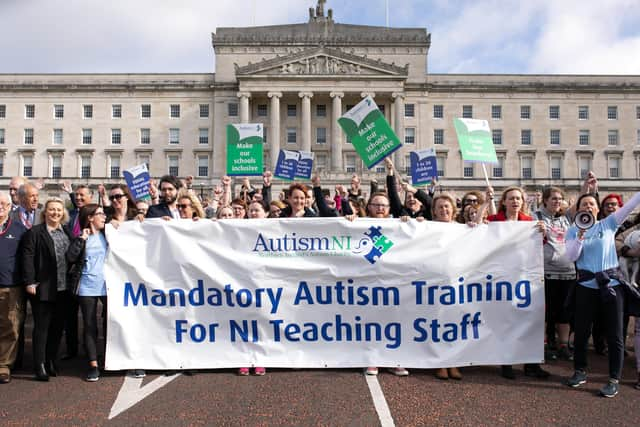Impact of lockdown on autistic children is significant says local charity


Concern has been expressed at the impact of the pandemic on Northern Ireland’s autistic community, many of whom depend on a sense of order in their lives.
School closures have been particularly hard on the 1 in 24 children aged four to 15 who have autism, with calls for help to Autism NI reflecting this.
Advertisement
Hide AdAdvertisement
Hide AdKelly Maxwell, Director of Family Support Services at Autism NI, said: “Education remains the top reason that families contact the Autism NI Helpline for support, during 2019/20 we received over 5,100 calls. Many highlighted difficulties with the lack of preparation implemented to support children adjust to changes.


“I am very concerned that the Covid-19 pandemic is having a significant impact on our autism community in Northern Ireland. Social distancing and self-isolation means that there are a lot of changes happening on a daily basis and routines and structure have consequently disappeared.
“Unexpected changes including the closures of schools and workplaces, can have a significant impact on an autistic individual’s anxiety and their ability to cope.
“This is further compounded by a number of support services being unavailable during this time, which has profound effects for a person’s emotional wellbeing.
Advertisement
Hide AdAdvertisement
Hide Ad“The time away from family, friends and school has left many autistic children without any social opportunities – hobbies, sports or access to friendships – and limited extended family supports.”


Autism NI is the Province’s biggest autism charity, established in 1990 to provide vital services for the 30,000 people affected by autism.
The charity provides Family Support services including a Helpline which receives 5,100 calls each year, a Support Group Network and early intervention services to over 2,000 families annually.
Autism NI is also involved in awareness raising and lobbying to ensure an equal society.
Advertisement
Hide AdAdvertisement
Hide AdStatistics released in May 2020 by the Department of Health detailed that 1 in every 24 children of school aged children (four to 15) are autistic and, in addition, 86% of those children are classified as having special educational needs.
Kelly said: “In relation to schooling, many of our parents have told us that they feel that their children, without the continuity of the school day, are regressing socially, emotionally, academically and behaviourally.
“For many a school offers routine, it provides clear differentiation on the fact school is ‘a working environment that is balanced with good access to play/social skills’. For autistic children it is clear ‘when I am in class, I complete school work’ whereas ‘my home is the place I relax, spend time with family and watch TV’.
“For some autistic children the transition to home schooling has not been easy, the clear differentiation on roles such as expectations from mum/teacher are now gone, this is creating huge additional pressures for families which are impacting on emotional wellbeing.
Advertisement
Hide AdAdvertisement
Hide Ad“Schools have the expertise of a multi-disciplinary staff team and can adapt practice to meet the needs of each autistic child. Therefore, if a concept or ‘building block’ of learning is achieved, they have a curriculum that that will naturally progress to the next area of learning, if the target is not achieved then strategies can be adapted and short term goals changed.
“It is unrealistic to expect all parents to have similar knowledge, skills or equipment at hand that schools do. It is not possible for every parent to replicate the materials and resources required at home exactly as they are carried out in school, which may also have additional resources such as classroom assistants, speech & language support, occupational therapy, Autism Advisory Intervention Service, etc.
“Overall, many of us recognise that whilst remote teaching offers opportunity during unprecedented times for learning to continue, it is more or less a one size fits all, whereas within a classroom environment a teacher can tailor the curriculum to each individual child.”
She added: “It is true to say that remote learning is not successfully working for everyone and I am concerned that children are missing out on early supports. As time goes on the gaps that were evident before the pandemic with their non-autistic peers, will have significantly widened even further.
Advertisement
Hide AdAdvertisement
Hide Ad“Returning to school after a lengthy break, will be difficult for autistic children and intense preparation will be required regarding new and significant changes which could make a transition back even harder. For example, different routines, rules, peers, support staff and for some different environments if they have transitioned to a new school provision.
“Good communication is essential in working towards a smooth restart, but many parents and professionals have reported to Autism NI that they do not find the messages from EANI and/or the Department of Education clear. Short notice decisions during the pandemic have also caused unnecessary distress and have had a detrimental impact on whole family units.”
On the importance of routine for children with autism, Kelly said: “Many autistic children have difficulty making sense of the world around them but the presence of a routine can create ‘order’ in their lives. Routine creates a safe and secure environment in which life is predictable.
“School often provides much more than a learning environment, it is a partnership approach that should place each child at the centre. It is a place that autistic children are taught with their peers, in a structured environment that undoubtedly reduces the additional pressures that many are facing during the pandemic.”
Advertisement
Hide AdAdvertisement
Hide AdIn terms of whether parents of autistic children should send their child to school if their school is offering that service for its more vulnerable pupils, Kelly said: “Often the decision is based on whether it is their child’s normal classroom environment, assistant, rules and routines. However, if this is a different class, new timetable and different teacher this can result in heightening anxieties that may have a detrimental impact on autistic children.”
Kelly pointed to Autism NI’s Rainbow Resource Kit which provides information to parents of newly diagnosed children and a range of strategies that can be implemented.
Elsewhere Autism NI offer a range of support pre and post diagnosis which can be availed of by ringing the helpline on 028 9040 1729.
Autism support officers can provide much needed early intervention, training opportunities and details of how to access support groups throughout Northern Ireland.
Advertisement
Hide AdAdvertisement
Hide AdThe charity works alongside organisations such as Family Support Hubs, Autism Intervention Teams, RISE NI, Autism Advisory Intervention Services and Child & Adolescent Mental Health Services to ensure that autistic people and their families are connected to a menu of options.
Kelly said: “It is clear the pandemic has had a profound impact on the autism community across Northern Ireland. At one point some services in health and education stopped altogether.
“Autism NI has been reaching out to the autism community who are feeling added pressure during the current crisis.
“We have developed a range of free educational and self-care resources specifically created to support families during this time.”
What is the right age to explain autism to child?
Advertisement
Hide AdAdvertisement
Hide AdKelly said: “When an autistic child is first diagnosed, there can be many questions from parents – these may include when and how to explain the diagnosis to their child.
“Parents may turn to professionals for guidance and support, but, unfortunately, there are no simple, step-by-step directions.
“The period immediately following diagnosis is one of huge adjustments. As parents gather more knowledge and understanding about autism, often confidence will grow and with it the recognition that they are the greatest, all-round expert on their child.
“When to explain will vary from child to child, but it’s important that the child has some understanding of the autism spectrum before they become aware and concerned about differences between themselves and peers.
Advertisement
Hide AdAdvertisement
Hide Ad“The consensus is overwhelmingly in favour of telling the child and telling them early on. Tony Attwood, a respected expert on autism, says the following – ‘experience indicates that explaining the diagnosis to an autistic child is extremely important. This will help prevent the development of inappropriate compensatory mechanisms and encourage the child to accept supports’.
“Having a basic understanding of autism generally reduces the child’s fears and self-blame and can help them better understand and accept themselves. Autistic children and adults often highlight that knowing about and understanding autism has helped provide a foundation of knowledge, which enabled them to explore their differences, access supports and build on their strengths.”
A message from the Editor:
Thank you for reading this story on our website. While I have your attention, I also have an important request to make of you.
With the coronavirus lockdown having a major impact on many of our advertisers - and consequently the revenue we receive - we are more reliant than ever on you taking out a digital subscription.
Advertisement
Hide AdAdvertisement
Hide AdSubscribe to newsletter.co.uk and enjoy unlimited access to the best Northern Ireland and UK news and information online and on our app. With a digital subscription, you can read more than 5 articles, see fewer ads, enjoy faster load times, and get access to exclusive newsletters and content. Visit https://www.newsletter.co.uk/subscriptions now to sign up.
Our journalism costs money and we rely on advertising, print and digital revenues to help to support them. By supporting us, we are able to support you in providing trusted, fact-checked content for this website.
Alistair Bushe
Editor